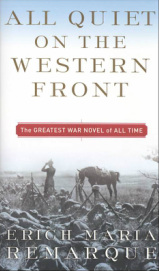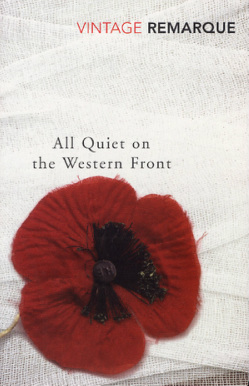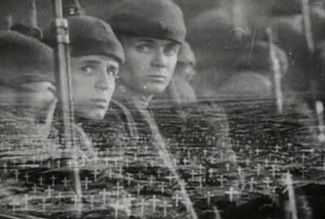 Click for Source Image
Click for Source Image Regularly billed as the world’s bestselling war novel, Erich Maria Remarque’s All Quiet on the Western Front is a very different beast from most of the heroic tales of gallantry and adversity that will pepper our TV screens and the promotional shelves of the major book shops on the anniversary of D-Day: a slow, sombre novel narrated by a German soldier in the front line trenches of the First World War.
 Click for Source Image
Click for Source Image Teamed up with a group of classmates from his rural town, protagonist Paul Bäumer recounts the sense of adventure affecting young recruits and, considering the sparse prose, paints a surprisingly vivid picture of their travels through the lines. The focus is not on the campaign itself but on the relationships of these close friends and, particularly, between Baümer and his NCO, a jovial Pole nicknamed Kat. They revel in the shared small pleasures that get them through, the first chapter opening with the arrival of extra rations and the words “We are satisfied and at peace.”
This is precisely what makes the novel so disarming when the darker moments come. The outbursts of violence, wherein members of the group are killed off by deafening artillery fire, are brief and rapid. Remarque describes horrendous wounds with no comment and moves on as his character becomes accustomed to everything around him. The most famous scene, where Baümer is trapped in a shell hole with a wounded Frenchman and must watch him die, is one of the few – together with his visits to his hometown – where the emotional impact is explored and both protagonist and reader realise how much damage has been done. By the end there is little left, every other cast member gradually killed off either suddenly or through agonising injury and disease, and the opening scenes are devastatingly mirrored: “I am very quiet. Let the months and years come, they can take nothing from me, they can take nothing more. I am so alone, and so without hope that I can confront them without fear.”
 Click for Source Image
Click for Source Image The principle themes of the novel still resonate today, and have done so throughout every major conflict including the Second World War: friendship, the loss of youth and innocence, failure to understand the meaning or purpose of fighting and the darkness of human nature. Most soldiers, including young conscripts, lost their formative years to conflict and never got them back, losing much of their sense of time and direction and any anchor in normality. Most lost friends. In the UK, where many of the D-Day celebrations are being held, the creation of so-called “Pal’s Battalions” – units organised to include groups of friends who had joined up together as a means of encouraging more to enlist – left entire towns and villages with no young men left alive. Worst of all is the aftermath, depicted perfectly in Baümer’s time on leave – his hatred for the older men who feed him beer and cigars, call him a hero and encourage him to get back to the action without having any idea how or why the war is being fought and, worse still, his attempt to reconnect with his family home that sees him acknowledge the complete loss of his identity and recount this in writing to his ailing mother.
Today’s festivities will be happy ones, in contrast to November’s Remembrance Day parades, and a time to remember the incredible group efforts, bravery and sacrifice that brought the second global conflict to an end and spared more families and friends from the same ordeal. Even so, let’s not forget the other side of it. All Quiet on the Western Front may be one of the saddest books you’ll ever read, but it also sincere, positive as often as it is devastating and a vivid portrait and reminder of what happened to those who were there. And it’s very, very good.





 RSS Feed
RSS Feed
